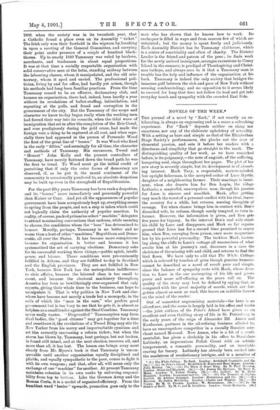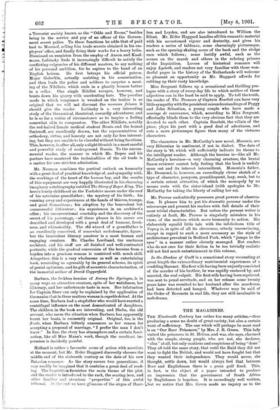NOVELS OF THE WEEK.*
THE perusal of a novel by " Zack," if not exactly an ex- hilarating, is always an engrossing and in a sense a refreshing experience. For " Zack " depends neither on slang nor smartness, nor any of the elaborate upholstery of actuality. With a setting as bare and simple as that of the Elizabethan Stage Society's performances, she plucks out the core of elemental passion, and sets it before her readers with a directness and simplicity that go straight to the mark. The distinguishing quality of her work, as we have remarked before, is its poignancy,—the note of anguish, of the suffering, hungering soul, rings throughout her pages. The plot of her new story is severely simple, but its development is of absorb- ing interest. Mark Tavy, a respectable, narrow-minded, but upright fisherman, is the accepted suitor of Luce Myrtle, daughter of a neighbouring farmer. Their marriage is immi- nent, when she deserts him for Ben Lupin, the village Lothario, a masterful, unscrupulous man, though his passion for Luce is sincere and unselfish. Mark, after getting very much the worst of a personal conflict with his rival, leaves the country for a while, but returns, nursing thoughts of revenge. Yet when chance brings him in contact with Ben's discarded wife, he refuses, though sorely tempted, to turn in- former. However, the information is given, and Ben gets five years for bigamy. In the interval Ben's real wife steals his child by Luce and disappears, and Mark so far regains ground that Luce has for a second time promised to many him, when Ben, emerging from prison, once more magnetises her by his powerful personality. The luckless Mark, hasten- ing along the cliffs to Luce's cottage all unconscious of what awaits him at his journey's end, discovers in a cave the skeletons of the missing wife and child, and returns to find the bird flown. We have only to add that The White Cottage, which is relieved by touches of grim though genuine humour, cannot be described as a novel of revolt pure and simple, since the balance of sympathy rests with Mark, whose devo- tion to Luce is the one mainspring of his life and grows purer and more self-effacing as the years roll on. The quality of the story may best be defined by saying that, as compared with the great majority of novels, which are for- gotten almost as soon as read, this leaves an indelible furrow on the mind of the reader.
Out of somewhat unpromising materials—the hero is an oil-refiner, and the scene is largely laid in his office and works —the joint authors of On Peter's Island have given us an excellent and even thrilling story of life in St. Petersburg in the early years of the reign of Alexander III. Anson and Kaufmann, partners in the oil-refining business alluded to, have an unscrupulous competitor in a rascally Russian mer- chant named Morozof. Now Anson, who is a bit of a senti- mentalist, has given a clerkship in his office to Stanislaus Lubizu3ky, an impecunious Polish Count with an artistic temperament, a romantic personality, and an insatiable craving for luxury. Lubinsky has already been sucked into the maelstrom of revolutionary intrigue, and is a member of • (1.) The White Cottage. By Zack. London : Archibald Constable and Co. [6s.3—(2.) On Peter's Island. By Arthur B. Ropes and Mary Ropes. London : John Murray. [6s.]—(3.) The Story of Roger King. By B. Paul Neuman. London : Hurst and Blackett. [6s.]—(4.) Among the Syringes. By Mary E. Mann, London: T. Fisher Unwin.Lysbeth. By H. Rider Haggard. London : Longmanand Co. [6s. —(84 The Treasure of Captain Scartett. By Adeline Sergeant. London : utchinson and Co. [64.]—(7.) Mononia. By Justin McCarthy. London : Chatto and Windus. [tW.] — (8.) Voysey. By B. 0. Prows°. London : W. Heinemann. [6..]—(9.) In Me Shadow of Guilt. By M. C. and B. Leighton. London : Grant Richards. [Cs.]
a Terrorist society known as the " Odds and Evens," besides being in the service and pay of an officer of the Govern- ment secret police. To these functions be adds that of paid tool to Morozof, selling him trade secrets obtained in his em- ployers' office, and finally firing their works for a heavy bribe. Dismissed on suspicion from the employ of Anson and Kauf- mann, Lubinsky finds it increasingly difficult to satisfy the conflicting exigencies of his different masters, to say nothing of his personal ambition, for he aspires to the hand of an English heiress. He first betrays his official patron, Major Golovkin, actually assisting in his assassination, and then leads the police and soldiers to surprise a meet- ing of the Nihilists, which ends in a ghastly human battue in a cellar. One single Nihilist escapes, however, and hunts down his quarry with unrelenting hate. The peculiar mode in which vengeance is wreaked on the traitor is so original that we will not discount the nouveau frisson it should give the reader. Lubinsky is a very interesting study of the thrasonical, theatrical, cowardly adventurer, and he is so far a victim of circumstance as to inspire a feeling somewhat akin to compassion. The other Nihilists, notably the red-haired female medical student Dania and the honest Smirnoff, are excellently drawn, but the representatives of orthodoxy, virtue, and honesty are not only fax less interest- ing, but they are unable to be cheerful without being facetious. This, however, is, after all, only a slight blemish in a most careful and powerful study of underground Russia. To the uncom- mercial reader, the manner in which Mr. Ropes and his partner have mastered the technicalities of the oil trade is a matter for awe stricken admiration.
Mr. Neuman combines the poetical outlook on humanity with a great deal of practical knowledge of, and sympathy with, the workings of the heart of the human boy, and the results of this equipment are very happily illustrated in his charming imaginary autobiography entitled The Story of Roger King. The hero's lonely childhood on the Yorkshire moors under the roof of his saturnine grandfather; the mystery of his birth ; his running away and experiences at the hands of thieves, tramps, and good Samaritans ; Cs adoption by the benevolent but unsuccessful litterateur ; his experiences in an architect's office ; his unconventional courtship and the discovery of the secret of his parentage,—all these phases in his career are described and developed with a great deal of humour, fresh- ness, and whimsicality. The old wizard of a grandfather is an excellently conceived, if somewhat melodramatic, figure ; but the benevolent literary amateur is a most human and engaging creature. Mr. Charles Loviband, the unctuous architect, and his staff are all finished and well-contrasted portraits, while the gradual conversion of the heroine from a hoyden into a gracious woman is contrived with much skill. Altogether, this is a very wholesome as well as entertaining book, reminding us agreeably by its general scheme, its spirit of genial optimism, and its gift of eccentric characterisation, of the immortal author of David Copperfield.
Barbara, the feckless heroine of Among the Syringas, is in many ways an attractive creature, spite of her untidiness, her illiteracy, and her unfortunate taste in men. Her infatuation for Captain Steer can only be explained by the application of the maxim that in these matters woman is capable de tout. At the same time, Barbara had a stepfather who would have exerted a centrifugal influence on the most domesticated of daughters. The children in the book are interesting, and Sheba, the old servant, who saves the situation when Barbara has apparently burnt her boats, is eminently original. Original, too, is the finale, when Barbara bitterly announces as her reason for accepting a proposal of marriage, " I prefer the man I don't know." In fine, the story has atmosphere and a certain fasci- nation, like all Miss Mann's work, though the resultant im- pression is decidedly painful.
Holland is rather a favourite scene of action with novelists at the moment, but Mr. Rider Haggard discreetly chooses the middle end of the sixteenth century as the date of his new Batavian romance. As the story covers two generations, it may readily be imagined that it contains a great deal of read- ing. The Inquisition furnishes the main theme of the plot, and the reader is introduced to the rack, the searing iron, and other familiar and atrocious " properties " of this awful tribunal. At the end we have glimpses of the sieges of Haar-
lem and Leyden, and are also introduced to William the Silent. Mr. Rider Haggard handles all this romantic material with his accustomed vigour and dexterity, and gives his readers a series of tableaux, some charmingly picturesque, such as the opening skating scene of the book and the sledge race which follows ; some luridly awful, such as the scenes on the marsh and others in the echoing prisons of the Inquisition. Lovers of historical romance will enjoy Ifysbeth, and readers not very familiar with those won- derful pages in the history of the Netherlands will welcome so pleasant an opportunity as Mr. Haggard affords for rubbing up their rusty knowledge.
Miss Sergeant follows up a sensational and thrilling pro- logue with a story of every-day life to which neither of these adjectives can in the least be said to apply. To tell the truth, the reader of The Treasure of Captain Scarlett can have very little sympathy with the persistent misunderstandings of Peggy and John Sebastian, a young couple who have made a man age de convenance, which, according to Miss Sergeant, effectually blinds them to the very obvious fact that they are devoted to each other. Captain Scarlett, the villain of the piece, plays his part with a good. deal of adroitness, and cuts a more picturesque figure than many of the virtuous characters.
The characters in Mr. McCarthy's new novel, Mononia, are very Hibernian in sentiment, if not in dialect. The date of the story is '48, which will sufficiently indicate its theme to the intelligent reader. Although the heroine is—like all Mr. McCarthy's heroines—a very charming creature, the brutal Saxon reviewer cannot help feeling that the book is unduly spun out and its interest intermittent Mononia's father, Mr. Desmond, is, however, an exceedingly clever sketch of a type of character, pompous, grandiloquent, lazy, weak, but to a certain extent attrac'iive, of which the monopoly by no means rests with the sister-island (with apologies to Mr. McCarthy for taking the liberty of calling her so).
Mr. Prowse undoubtedly possesses great powers of observa- tion. It pleases him to put his dramatis persona under the microscope and present his readers with full details of their most trivial characteristics. But unless the present writer is entirely at fault, Mr. Prowse is singularly mistaken in bis views of the motives which move humanity to action. His elaborately squalid little tale with the infelicitous title of Voysey is, in spite of all its cleverness, utterly unconvincing, except in regard to such a mere accessory as the style of architecture prevalent in Bedford Park, which "jumps to the eyes" in a manner rather cleverly managed. But readers who do not care for their fiction to be too trivially realistic will not find much entertainment in this volume.
in the Shadow of Guilt is a sensational story recounting at great length the extraordinary matrimonial experiences of a confiding Baronet. His first wife having been unjustly convicted of the murder of his brother, he was rapidly enslaved by, and married, the real culprit. His first wife having been reprieved, was sent to penal servitude, and on her release some twenty years later was reunited to her husband after the murderess had been detected and hanged. Whatever may be said of the Order of Baronets in real life, they are still invaluable in melodrama.











































 Previous page
Previous page